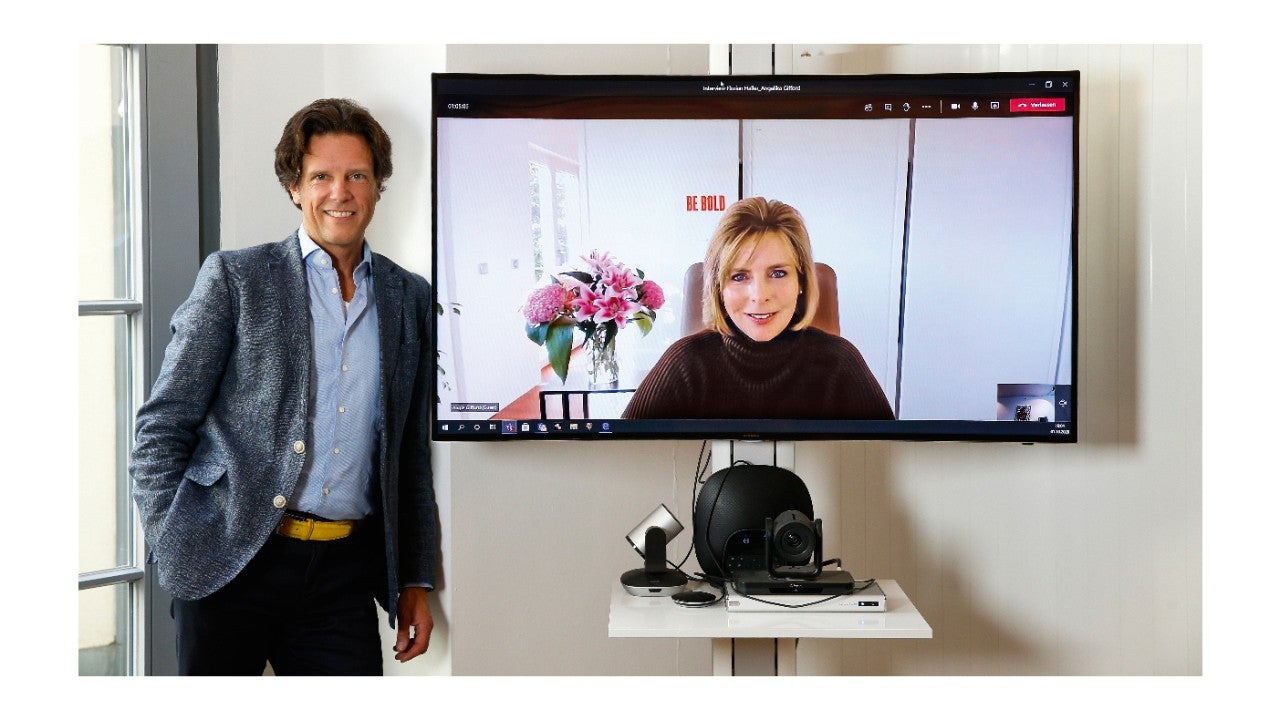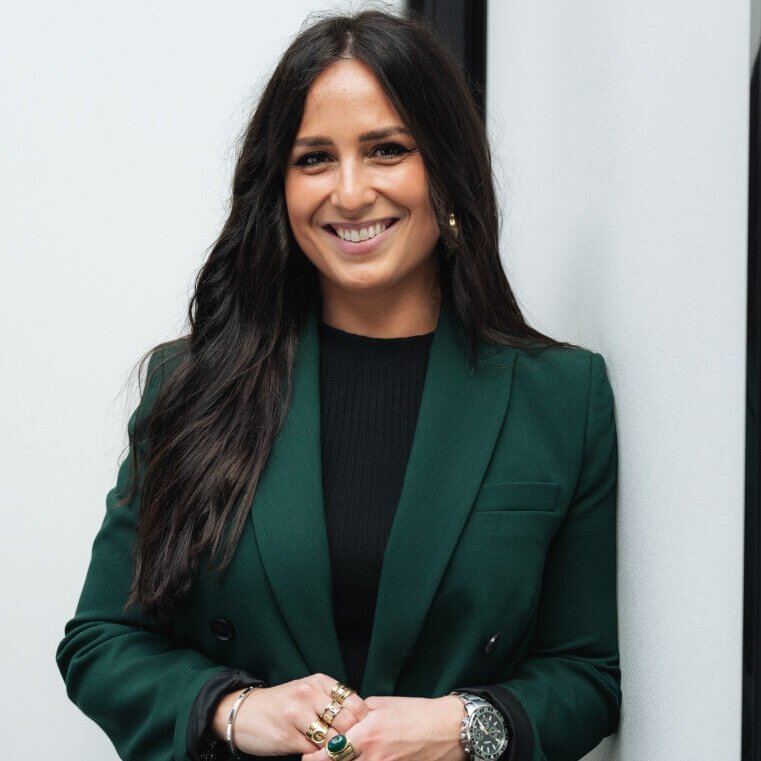
We are a learning organisation
Regarding innovation – what do companies have to do to keep one step ahead? Facebook Manager Angelika Gifford on the innovation culture of a tech giant.
Florian Haller: Thinking outside the box, constantly reinventing yourself – is “rethinking” part of the DNA of tech companies like Facebook?
Angelika Gifford: I would even go as far to say that constantly questioning and rethinking things is a key part of our Facebook DNA. Our guiding principle is that, in everything we do, we remain true to our company mission, i.e. using our platforms to bring people together and give them a voice. When rethinking the services we provide, the question we ask ourselves is: what do people who use our services need right now? Only last summer, for example, we launched Messenger Rooms – a simple video conferencing tool in Facebook Messenger that anyone can use – and also increased the number of participants for group video calls in WhatsApp to eight, all based on feedback we had received. For me, rethinking also means never being satisfied with how our product currently stands, but instead always asking how we can improve things – how we can simplify, speed up, adapt and further develop them. This kind of thinking is very prevalent at Facebook.
Florian Haller: The Facebook we know today is very different to what it was 16 years ago. Were there any specific milestones that marked key changes during this time or was it more of an ongoing process?
Angelika Gifford: It is an ongoing change process, which is why adjustments often occur continually and gradually over time and are not immediately obvious. On the whole, however, we have clearly evolved – for example with regard to “election integrity”, i.e. everything we do to ensure transparent and secure political elections. I am also seeing a significant change on the communication front: I believe that, over time, we have got better at explaining who we are, what we do, how we think, how we approach things and why. Giving a face to Facebook is also my personal ambition. We need to be more accessible, more tangible. Needless to say, we make mistakes too – and have a long way to go before we are where we want to be. But at the same time we are a learning organisation and are constantly advancing and reinventing ourselves.
Florian Haller: With regard to innovation, what do companies have to do to keep one step ahead?
Angelika Gifford: I have worked for very successful entrepreneurs in my time – 21 years for Bill Gates and now almost a year for Mark Zuckerberg. And I see a lot of similarities. Point one: the vision and perseverance needed to launch strong, relevant products on the market. Point two: a high level of diversity within the company – not just a healthy gender balance but also a healthy mix of people with different religious, geographical, ethnic, cultural and political backgrounds, etc. You need to hear a lot of different voices and reflect the diversity of users and customers within the company. Point three: a certain restlessness that you need to be able to keep pace with. The Americans really toughen you up in this regard! This means resolutely business-minded thinking and the willingness to change, to create a learning organisation. In other words, making mistakes is allowed – and even encouraged – as long as you learn from them and use them to grow. And the fourth point: keep employees in the picture, empower and encourage them to constantly question themselves and the company.
Florian Haller: What form does empowerment have to take so that it actually makes itself felt by your 56,000-plus employees around the world and has an impact? What is your secret?
Angelika Gifford: First of all, we try to materialise our culture throughout the company – including physically. Our posters, screensavers, stickers and documents, for instance, carry messages like “Be bold”, “Move fast” or even “What would you do if you weren’t afraid?”. You have to inspire and encourage people again and again, reminding them that we are all in this together, that all opinions are heard and everyone can and should make a contribution.
Florian Haller: Posters and screensavers – is that all you need?
Angelika Gifford: No, those are just a few specific examples. Overall, we are a very permeable organisation with a very transparent, participative corporate culture. Some companies have an open-door policy – in many cases, the workspaces in our offices don’t even have doors! Apart from that, I really love the notion of making others look great: if you have a cool idea, you should feel that you can develop it and get other people on board and actively involved. And you should also have the courage to approach management with it – that’s the most important thing as far as I’m concerned.
Florian Haller: German society is not – as yet – very diverse. How do you bring diversity into your organisation at all your different locations?
Angelika Gifford: First of all, by setting great store by diversity in our recruitment and training activities. Everyone involved in job interviews has been trained in dealing with prejudices and taken many other mandatory training courses as well. As a global, English-speaking company, we can offer many employees the opportunity to move to another country – Germany, for instance – for two or three years to get to know the market and the customers there.
Florian Haller: How much mobility do you expect from potential employees?
Angelika Gifford: Right now, we are also hiring people in places where we don’t even have an office and providing them with the equipment they need to work from home. This allows us, for instance, to secure top Eastern European talent who are not necessary willing or able to work in our central office in Warsaw. I see this as being yet another step towards more diversity at Facebook but also towards new, more flexible working models. We estimate that one in two Facebook employees will be working from home permanently in the next five to ten years.

Florian Haller: What role do high-profile entrepreneurs like Mark Zuckerberg or Elon Musk play in the context of innovation? Are they overrated by the general public?
Angelika Gifford: These entrepreneurs have a strong vision and an exciting business idea. Mark Zuckerberg, for example, is a truly exceptional person: he is 36, a visionary, disruptive, unconventional and also provocative in certain ways. And he has a very clear vision: to give people all over the world – more than 3.1 billion people at last count – the chance to interact and form communities. As well as this, he established a truly open, trust-based and feedback-oriented culture at Facebook, where everyone is enabled and encouraged to question their own thinking and act on their own responsibility. He shares not only his ideas but also things that have not gone well. He is the only CEO I have ever seen that answers questions from his entire workforce every week. These are not discussed beforehand – anyone can bring up issues that they are concerned about, from IT equipment to corporate strategy, and Mark addresses it and explains his standpoint. As majority shareholders, entrepreneurs like Mark Zuckerberg also have the scope they need to pursue a long-term, coherent strategy and to invest in innovations.
Florian Haller: Most of Facebook’s employees are quite young, which must make you the “adult in the room”. Shouldn’t the European boss be 28 or 30 years old too?
Angelika Gifford: Perhaps that would be better (laughing)? No, I don’t think it would, actually! We have no end of highly creative, agile, quick-thinking, smart people at Facebook. While participation and empowerment of individuals are important, agility can’t be allowed to lead to chaos. We are growing as a company, which calls for clear framework conditions, game rules and a definite course and set priorities – all to establish order out of this rich creative chaos and to derive a goal that everyone can then work towards. As I see it, what is needed is a symbiosis of structure-giving management on the one hand and creativity and agility on the other.
Florian Haller: Germany isn’t exactly cutting a very fine figure on the digitalisation front. What factors would you urge the country and its companies to rethink?
Angelika Gifford: I have long been disappointed by the level of digitalisation here in Germany. The fact that we are doing so poorly in this respect also has something to do with our mentality. People in Germany are often afraid – or, at the very least, sceptical – of new things. I get a sense of that when I talk to people, and especially when I talk to small and medium-sized companies. People often have reservations about technology; they are afraid that artificial intelligence will rule the world. We need to assuage this fear. A change of mentality is needed – people shouldn’t see technology as a threat but rather as an opportunity and as something that enriches their lives. And then there are the bureaucratic hoops that you have to jump through in Germany today if you want to drive forward innovation. Don’t get me wrong: we do need strong data protection laws, for example. But if, as Bitkom claims, new, innovative projects fail in half of all companies because of data protection concerns, then that is very alarming indeed. And then there’s also the matter of implementation: there’s a lot of talk about digitalisation and plenty of brightly coloured charts being bandied about, but very few companies actually invest properly or actually implement things that would change their business models and their culture. However, all of this needs to happen if a company can be said to have successfully embraced digitalisation.
Florian Haller: From Facebook’s perspective, where is the technology journey headed? What is the “next big thing”?
Angelika Gifford: Our focus is on three areas in particular. First of all, we have our Facebook Artificial Intelligence Research Lab with an international team that conducts fundamental research in the field of artificial intelligence. I’m not a techie, but what this team is doing is truly cutting-edge stuff. My other favourite subject is what Mark Zuckerberg sees as a major mobile trend, namely virtual and augmented reality. We only recently unveiled the latest version of our Oculus Quest headset and there are very exciting application opportunities, not only in the private sphere but also in a business context: such as virtual training sessions in DHL distribution centres, virtual operations training at Johnson & Johnson or virtual hotel tours for Hilton staff. Smart glasses are also set to make waves next year. We are working on integrating all applications in a small pair of glasses, which, for example, would allow you to have directions displayed when exploring Munich on foot. A third area is sustainability. Many people are not aware of this, but Facebook is already the second-largest user of renewable energies in the world. We have also set ourselves clearly defined climate neutrality targets for 2030: this means that our suppliers will also have to have implemented sustainability targets of their own and we want to have the world’s most innovative data centres on the net. We have also created a climate information centre, a tool on Facebook that anyone can access from their menu – by providing specific examples and facts here, we aim to inspire our users to adopt a more sustainable lifestyle.
Florian Haller: Speaking of which, can I mention that you are talking to the boss of Germany’s first climate-neutral agency group? We were certified after just one hundred days and are very proud of this. But to return to an earlier point, I have the impression that things have gone rather quiet on the AR and VR front in recent months. I don’t feel there is a real connection to people’s everyday lives.
Angelika Gifford: At the moment, we are working on this very aspect – bringing technology into everyday life, for example in glasses that we want to develop together with EssilorLuxottica brand Ray-Ban. It will definitely take years before we have a mass-market product that people can put on in the morning like a normal pair of glasses. But our vision is to develop useful products for people and we are also taking them with us on this journey of innovation.
Florian Haller: What is the most important advice you would give companies regarding future viability?
Angelika Gifford: If I had the magic formula, we probably wouldn’t be talking here today (laughing)! Seriously, what do we need to do? We need to advance digitalisation resolutely, to actively drive innovation. To do that we need the relevant skills. Which in turn means teaching our children these skills and making IT and digital media fun for them. And this is exactly where policymakers need to create the right framework conditions, be it for education and training or for flexible working models. And we all need to recognise that technology is an opportunity rather than a threat. We need to use it sustainably to keep ahead of the pack in the globalised world.
This article was first published in our Serviceplan Group TWELVE magazine.
Interested in more content?
Back to Issue #2








